Astrotheology as Public Theology
SR 1162
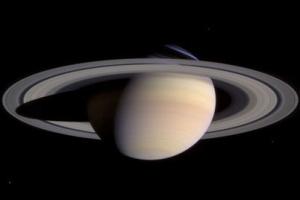 Should we think of Astrotheology as Public Theology? Is there anything more public than outer space? Is there anything more public than the science of astrobiology? Public Astrotheology? Is there any other kind?
Should we think of Astrotheology as Public Theology? Is there anything more public than outer space? Is there anything more public than the science of astrobiology? Public Astrotheology? Is there any other kind?
Here we ask: is the public astrotheologian responsible for analyzing the three-way interaction between the telescope, the church pew, and the TV room couch? More specifically, should the public theologian attend to the interaction of outer space, the God of grace, and our cultural pace? My answer? Yes.
Astrobiology is science. Public astrotheology is religious reflection on astrobiology. The astrotheologian orients all that we know about the cosmos into a single worldview in which everything is oriented toward the one God of grace.
If you want more resources on Public Theology, click here.
Astrotheology at the Center for Process Studies
In May of 2022, the Center for Process Studies at Willamette University hosted a research conference among scientists and theologians. The topic? “Astrobiology, Exo-Philosophy and Cosmic Religion.” Many of my favorite colleagues in astrobiology were there. So also, my friends who are disciples of Alfred North Whitehead and his process metaphysics. The title of my paper? “Astrobiology, Astrotheology, and Cosmic Consciousness.”
Astrotheology as Public Theology
Here is our working definition of Astrotheology.
“Christian Astrotheology is that branch of theology which provides a critical analysis of the contemporary space sciences combined with an explication of classic doctrines such as creation and Christology for the purpose of constructing a comprehensive and meaningful understanding of our human situation within an astonishingly immense cosmos” (Peters 2013, 443).
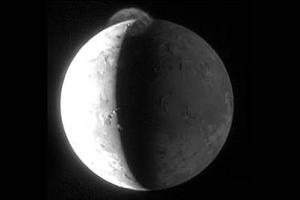 In this Patheos series on public theology, we have repeatedly lifted up a Theology of Nature informed by science. Paul Scherz, among others, would agree that the public theologian should “combine respect for scientific research with caution in regard to its application” (Scherz 2018, 1049). This caution includes distinguishing between solid science, misleading scientism, and the intelligibility of genuine faith in God. [1]
In this Patheos series on public theology, we have repeatedly lifted up a Theology of Nature informed by science. Paul Scherz, among others, would agree that the public theologian should “combine respect for scientific research with caution in regard to its application” (Scherz 2018, 1049). This caution includes distinguishing between solid science, misleading scientism, and the intelligibility of genuine faith in God. [1]
More specifically, here in Patheos we have given special attention to what the space sciences tell us about our glorious yet mysterious cosmos. In one post we asked whether the Copernican Principle is a scientific or cultural principle, concluding that it is neither. Another post dealt with Lucas Mix, astrobiologist and theologian, on life in the cosmos. In another post we asked if NASA along with hired priests were preparing for ETI contact. In still another post we asked if alien scientists are our real gods? In this newsletter post, we extend our speculations into astrotheology.
Should the Interaction of Faith with Science Count in Public Astrotheology?
As mentioned, this post is an exercise in public theology. “Public theology is conceived in the church, reflected on critically in the academy, and addressed to the world for the sake of the world” (T. Peters, Public Theology: Its Pastoral, Apologetic, Scientific, Political, and Prophetic Tasks 2018, 153).
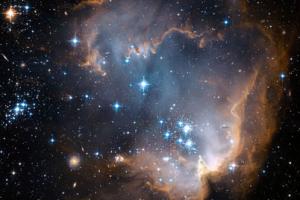 Should the interaction between faith and space count in public theology? Yes, according to the editors of the International Journal of Public Theology. It is fascinating that the one science the editors mention is astrobiology.
Should the interaction between faith and space count in public theology? Yes, according to the editors of the International Journal of Public Theology. It is fascinating that the one science the editors mention is astrobiology.
“A public theology seeks to be in creative dialogue with different academic disciplines, including politics, economics, law and security studies, cultural studies, religion, spirituality, the natural science and the social sciences and the study of globalization. It is sensitive to the emergence of new publics that arise out of theology’s engagement with other new disciplines – like astrobiology – which redefines understandings of what is space and what is public.“
This reinforces what hybrid astronomer and systematic theologian David Wilkinson proffers. “Theologians need to take seriously SETI and to examine some central doctrines of religious belief in light of the possibility of extraterrestrial life, hopefully with a spirit of…curiosity” (Wilkinson 2013, 3-4). More than curiosity. How about a spirit of welcome for new space neighbors we have yet to meet?
Extraterrestrial Intelligence: Academic and Societal Implications
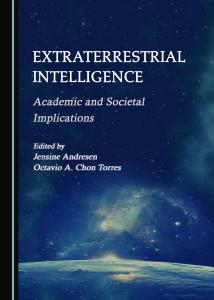 We have a new book to celebrate. Jensine Andresen along with Octavio Chon Torres have just edited Extraterrestrial Intelligence: Academic and Societal Implications (2022). Last year, Octavio and I along with two colleagues, Joseph Seckbach and Richard Gordon, put together Astrobiology: Science, Ethics, and Public Policy (2021). Now, in this new volume, we move from hard science to cultural meaning. This move is like offering ice water to the desert-thirsted astrotheologian.
We have a new book to celebrate. Jensine Andresen along with Octavio Chon Torres have just edited Extraterrestrial Intelligence: Academic and Societal Implications (2022). Last year, Octavio and I along with two colleagues, Joseph Seckbach and Richard Gordon, put together Astrobiology: Science, Ethics, and Public Policy (2021). Now, in this new volume, we move from hard science to cultural meaning. This move is like offering ice water to the desert-thirsted astrotheologian.
The new book’s theme is cosmic consciousness. This is also the theme of my chapter in the book. We ask: how does our awareness of the unfathomable distances of space and the prospect of sharing outer space with extraterrestrial neighbors affect the consciousness of us earthlings? Then, it gets more subtle. Is our growing cosmic consciousness merely objective, merely scientific? Or, has an extraterrestrial consciousness entered into our terrestrial subjectivity, into our awareness of self, world, and God? (T. Peters, Will Extraterrestrial Consciousness Remap the Terrestrial Mind? 2022)
Extraterrestrials and Our Cosmic Consciousness
Let me report briefly on the consciousness raising of Jensine Andresen. Jensine’s ruminations build a multi-span bridge linking astrobiology, UAP (Unidentified Aerial Phenomena) studies, the paranormal, moral urgency, and spirituality. The astrotheologian will want to walk this bridge that connects science with culture.
First, Jensine clears the dust kicked up by Stephen Hawking and others. Hawking and other respected spokespersons have warned us to ready ourselves for interstellar battle. Why? Because, allegedly, hostile aliens with advanced military technology are headed to Earth to conquer, subjugate, and exploit.
Not so, says Jensine in a calming tone. “I am certain that the ETI responsible for extraterrestrial UAP operating on and around Earth is not a threat to humankind.” (Andresen, Mind of the Matter, Matter of the Mind 2022, 304). How is she certain?
Because, she contends, we sinful earthlings are merely projecting our own violence onto imaginary enemies. It takes a theologically acute eye to see that the darkness is on Earth. Light comes from heaven.
Secondly, what does Jensine actually say? She tells us that the human race on Earth is fallen. As fallen, we are in need of celestial saviors in the form of more highly intelligent and more morally advanced aliens. “To ETIs…human beings must appear profoundly immature in their impulses and outbursts, particularly those that hurt and kill other human beings, eradicate other species, and damage the environment….ETI has good reason to be concerned about humanity, which is at the brink of annihilating itself.” (Andresen, Mind of the Matter, Matter of the Mind 2022, 305). Because we on Earth are the violent ones, we need celestial saviors to save us from ourselves. Does our earthly need automatically translate into the saving power of ETIs coming from our heavens to rescue us from ourselves?
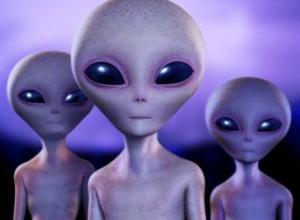 Let’s get more specific. We violent earthlings are once again on the brink of nuclear self-annihilation. We have made bombs sufficiently powerful to render our species extinct. Like angels wringing their wings in desperation, ETI would like to protect us from self-destruction.
Let’s get more specific. We violent earthlings are once again on the brink of nuclear self-annihilation. We have made bombs sufficiently powerful to render our species extinct. Like angels wringing their wings in desperation, ETI would like to protect us from self-destruction.
“The ETI keeping tabs on humankind is not merely interested in physical events, such as nuclear explosions, but it also is interested in human consciousness…Because ETI understands the inseparability of consciousness and matter, it evaluates how human thinking and human technological capabilities are interwoven and sculpts its interactions with human beings accordingly….nuclear weapons are so destabilizing to the whole” of reality. (Andresen, Mind of the Matter, Matter of the Mind 2022, 309).
Here is the prophetic message sent from ETI to Earth’s human species. “Nuclear weapons are in fact hackable from a distance. You therefore must abolish all nuclear weapons on Earth, and you should not position nuclear weapons in space.” (Andresen, Mind of the Matter, Matter of the Mind 2022, 312, Andresen’s emphasis). Have we heard this message? Abolish all nuclear weapons!
Jensine herself aches at the prospect that Homo sapiens on Earth will self-destruct through a nuclear conflagration. Like the angels of old, today’s ETI are similarly anguished at what theologians call, “sin.” If the nuclear apocalypse comes tomorrow, our extraterrestrial friends will side with the Children of Light over against the Children of Darkness.
Cosmos Charter in Public Astrotheology & Astroethics
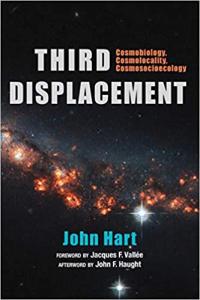
As the Scout Motto has alerted us: “be prepared!” If the apocalypse is delayed, we will need to be prepared to share our cosmic consciousness with new space neighbors. I have previously argued that astroethics should foster the concept of a galactic common good.
Public theology, I have stressed, is conceived in the church, critically reasoned in the academy, and offered to the wider culture for the sake of the planetary common good. Might we extrapolate a geocentric notion of the common good beyond Earth? If so, how far beyond Earth should our minds wander? The Milky Way galaxy? The entire universe? Is it reasonable to hold that all things in the cosmos are sufficiently connected that we can realistically consider a commons?
Yes, according to Mark Lupisella at NASA’s Goddard Space Flight Center. Everything in the entire universe is connected if for no other reason than to say it all evolved from one source, the Big Bang. Predicated on this past evolutionary connectedness, Lupisella proposes an ethic based upon a connection-action principle. “The connection-action principle…suggests that the universe’s fundamental property of connectedness is manifested as relations and action, and hence ultimately as creativity–potentially in ever increasing degrees”(Lupisella, 2016, 77). Would this imply we have supra-galactic moral responsibilities?
My friend John Hart, recently retired from Boston University, expands on this notion of cosmic connectedness. He proffers the concept of a cosmic common good. Still further, he proffers the idea of a Cosmos Charter in his recent book, Third Displacement.
“The Cosmos Charter elaborates requirements for peace with justice in the near and distant future, on Earth and on other worlds that humankind will see, and perhaps will survey and settle.”(Hart, 2020, 263).
As if he were on the Starship Enterprise, Hart mandates that we “Respect all intelligent species’ integrity, and all species’ evolutionary development, in native niches”(Hart, 2020, 267). Cosmic consciousness has dawned.
Conclusion
Here is our basic question: should the public theologian attend to the interaction of outer space, the God of grace, and our cultural pace? My answer? Yes.
One the one hand, the Copernican Principle means that cosmic consciousness provides us on Earth with a perspective. Space is big, magnificent, unfathomable. We are small.
On the other hand, in an oblique and distorted way, cosmic consciousness prompts awareness of our own fallenness. Our own needless violence. Our own insane penchant for self-destruction.
Perhaps the public astrotheologian can serve the common good by pointing this out.
▓
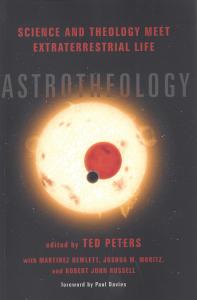 Along with Martinez Hewlett, Joshua Moritz, and Robert John Russell, Ted Peters co-edited, Astrotheology: Science and Theology Meet Extraterrestrial Intelligence (2018). Along with Octavio Chon Torres, Joseph Seckbach, and Russell Gordon, he co-edited, Astrobiology: Science, Ethics, and Public Policy (Scrivener 2021). He is also author of UFOs: God’s Chariots? Spirituality, Ancient Aliens, and Religious Yearnings in the Age of Extraterrestrials (Career Press New Page Books, 2014). See his website: TedsTimelyTake.com.
Along with Martinez Hewlett, Joshua Moritz, and Robert John Russell, Ted Peters co-edited, Astrotheology: Science and Theology Meet Extraterrestrial Intelligence (2018). Along with Octavio Chon Torres, Joseph Seckbach, and Russell Gordon, he co-edited, Astrobiology: Science, Ethics, and Public Policy (Scrivener 2021). He is also author of UFOs: God’s Chariots? Spirituality, Ancient Aliens, and Religious Yearnings in the Age of Extraterrestrials (Career Press New Page Books, 2014). See his website: TedsTimelyTake.com.
▓
[1] There are resources as I frequently point out. If you are an evangelical Christian, tether yourself to BioLogos. If you are a Muslim, note how Iranian physicist, Medhi Golshani, collects affirmative testimonies in his series of books, Can Science Dispense with Religion? (Golshani, 2021) If you are Jewish, then visit Sinai and Synapses. If you are a Lutheran, join the Lutheran Alliance for Faith, Science, and Technology and visit monthly Covalence Magazine.At the AAAS in Washington DC, astronomer Jennifer Wisemen directs DoSER (Dialogue on Science, Ethics, and Religion). (ESSSAT (European Society for the Study of Science and Theology) publishes a fine newsletter. Visit also Greg Cootsona’s blog, Science for the Church, along with reading the Science and Religion Initiative Newsletter. The journal, Zygon, has been a pioneer publication for half a century, drawing scholars from IRAS (Institute for Religion in an Age of Science).
The Clergy Letter Project under the leadership of Michael Zimmerman focuses on the evolution controversy and the ecological crisis. At Cambridge University, Denis Alexander leads the Faraday Institute for Science and Religion. Are you down under? Then try Australia’s thriving organization, ISCAST (Institute for the Study of Christianity in an Age of Science and Technology).
In Berkeley, I work with physicist-theologian Robert John Russell at the Center for Theology and the Natural Sciences, which is part of the Graduate Theological Union. For two decades we have published a fine scholarly journal, Theology and Science. The science-religion sandbox is filled with lots and lots of toys for our minds to play with.
Here’s a VIDEO: “Will Ufologists and Astrobiologists Dine at the Same BBQs?”
For levity, sing along with Francis Collins, former director of the U.S. National Institutes of Health, and Paul Vischer, creator of Veggie Tales.
References
Andresen, Jensine. 2022. “Mind of the Matter, Matter of the Mind.” In Extraterrestrial Intelligence: Academic and Societal Implications, by eds Jensine Andresen and Octavio Chon-Torres, 281-330. Cambridge UK: Cambridge Scholars Press.
Hart, John, 2020. Third Displacement: Cosmobiology, Cosmolocality, Cosmosocioecology. Eugene OR: Cascade.
Lupisella, Mark, 2016. “Cosmological theories of value: relationalism and connectedness as foundations for cosmic creativity.” The Ethics of Space Exploration. Eds., JSJ Schwartz and T Milligan. Heidelberg: Springer, 75-92.
Peters, Ted. 2013. “Astrotheology.” In The Routledge Companion to Modern Christian Thought, by eds Chad Meister and James Beilby, 838-853. London: Routledge.
Peters, Ted. 2021. “Astrotheology’s contribution to public theology: From the extraterrestrial intelligence myth to Astroethics.” HTS Teologeise Studies 77:3 1-8.
Peters, Ted. 2021. “Public Theology, Discourse Clarification, and Worldview Construction.” Theology and Science 19:1 1-4; DOI.org/10.1080/14746700.2020.1869672 .
Peters, Ted. 2018. “Public Theology: Its Pastoral, Apologetic, Scientific, Political, and Prophetic Tasks.” International Journal of Public Theology 12 (2): 153-177.
Peters, Ted. 2011. “The Implications of the discovery of extra-terrestrial life for religion.” The Royal Society: Philosophical Transactions A 369: 644-655; https://secureservercdn.net/198.71.233.72/kht.6bb.myftpupload.com/wp-content/uploads/2013/03/2011RoyalSoc.pdf.
Peters, Ted. 2022. “Will Extraterrestrial Consciousness Remap the Terrestrial Mind?” In Extraterrestrial Intelligence: Academic and Societal Implications, by eds Jensine Andresen and Octavio Chon Torres, 187-217. Cambridge UK: Cambridge Scholars Publishers.
Peters, Ted, Martinez Hewlett, Joshua Moritz, and Robert John Russell, eds. 2018. Astrotheology: Science and Theology Meet Extraterrestrial Life. Eugene OR: Cascade Books ISBN 978-1-5326-0639-7 / eBook 978-1-5326-0640-3.
Scherz, Paul. 2018. “Laudato Si and the Use of Scientific Research in Theology and Public Theology.” Heythrop Journal LIX 1049-1059.
Wilkinson, David. 2013. Science, Religion, and the Search for Extraterrestrial Intelligence. Oxford: Oxford University Press.













